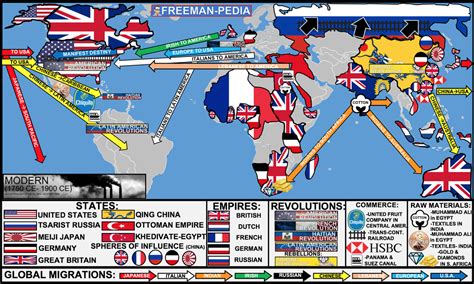Table of Contents
- Industrialization and Imperialism (1750-1914)
- The Global Economy and the Rise of Industrialization
- The Impact of Imperialism on Africa and Asia
- The Rise of Nationalism and the End of Empires
Industrialization and Imperialism (1750-1914)
The Industrial Revolution was a period of rapid technological innovation that began in the mid-18th century. It led to the development of new machines and processes that made it possible to produce goods more efficiently. This led to a dramatic increase in the production of goods and services, which in turn led to economic growth.

Imperialism is the policy of extending a country’s power and influence through diplomacy or military force. During the 19th century, the major European powers, including Great Britain, France, Germany, and Russia, competed for control of territories in Africa and Asia. This competition led to a number of wars and conflicts, and it also resulted in the establishment of a number of colonial empires.
The Global Economy and the Rise of Industrialization
The Industrial Revolution had a profound impact on the global economy. It led to the creation of a global market for goods and services. This market was dominated by the European powers, who used their colonies to supply them with raw materials and to buy their manufactured goods.
The Industrial Revolution also led to the rise of new economic powers, such as the United States and Japan. These countries were able to industrialize rapidly and they soon became major players in the global economy.
The Impact of Imperialism on Africa and Asia
Imperialism had a devastating impact on Africa and Asia. The European powers exploited the resources of these continents and they often used violence to suppress local resistance. This led to the deaths of millions of people and it also caused widespread economic and social disruption.
Imperialism also had a negative impact on the environment. The European powers often cleared forests and other natural resources to make way for plantations and mines. This led to soil erosion and other environmental problems.
The Rise of Nationalism and the End of Empires
In the late 19th and early 20th centuries, nationalism began to rise in Africa and Asia. Nationalism is a sense of pride in one’s country and a desire for independence. This led to a number of independence movements, which eventually led to the end of most of the European colonial empires.
The rise of nationalism also had a profound impact on the global economy. It led to the creation of new markets for goods and services, and it also contributed to the growth of the global economy.
Common Mistakes to Avoid
When studying AP World History Unit 9, it is important to avoid the following common mistakes:
- Thinking that the Industrial Revolution was a purely European phenomenon. The Industrial Revolution was a global phenomenon that had a profound impact on all of the world’s continents.
- Assuming that imperialism was a purely negative force. Imperialism had both positive and negative consequences. While it did lead to the deaths of millions of people and it caused widespread economic and social disruption, it also led to the creation of a global market for goods and services and it contributed to the growth of the global economy.
- Thinking that nationalism was a purely positive force. Nationalism can be a positive force, but it can also be a negative force. When nationalism is used to justify violence or oppression, it can be a very destructive force.
Tables
| Country | Population (1914) | GDP per capita (1914) |
|---|---|---|
| United Kingdom | 46.5 million | $5,000 |
| France | 41.9 million | $4,500 |
| Germany | 67.0 million | $4,000 |
| Russia | 174.9 million | $2,000 |
| United States | 92.0 million | $6,000 |
| Colony | Year of Independence |
|—|—|—|
| India | 1947 |
| Pakistan | 1947 |
| Bangladesh | 1971 |
| Sri Lanka | 1948 |
| Myanmar | 1948 |
| Region | Number of Colonies |
|—|—|—|
| Africa | 57 |
| Asia | 32 |
| Latin America | 17 |
| Industry | Year of Invention |
|—|—|—|
| Steam engine | 1769 |
| Cotton gin | 1793 |
| Telephone | 1876 |
| Automobile | 1886 |
| Airplane | 1903 |
